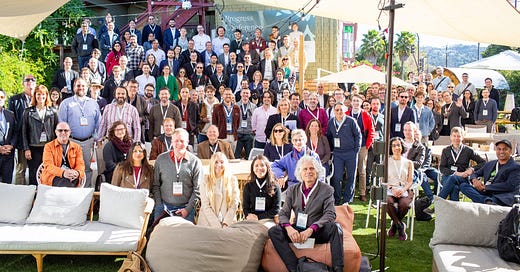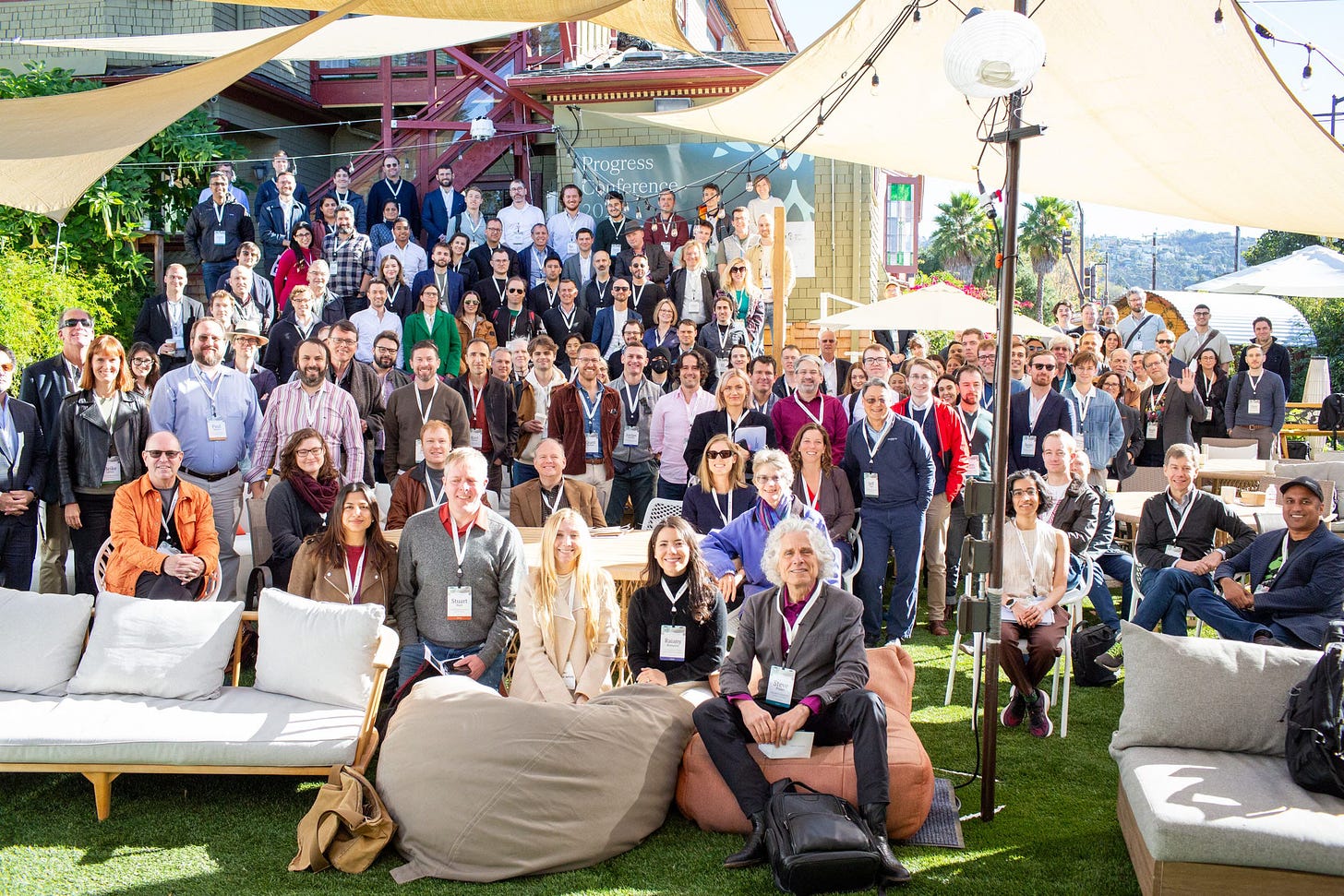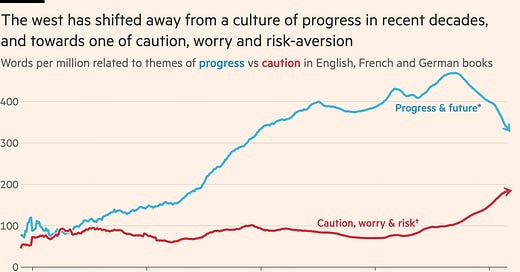

Discover more from The Free Market Futurist
I have a long tradition on Election Day of writing about anything except the election. It’s too late to offer advice on how to vote, but too early to evaluate the results.
This year, I chose a topic that is in some ways the exact opposite of the election: progress.
In late October, I spent a weekend at a conference in Berkeley, California, sponsored by the Roots of Progress Institute. It was the first attempt that I know of to gather all in one place people who are connected to the new and growing field of “progress studies.”
There are a few of us who have been touting the importance of human progress for a long time: the actual historical fact of technological, economic, moral, and political progress—but also the need to celebrate it and study it.
Five years ago, Patrick Collison and Tyler Cowen wrote an influential article in The Atlantic calling for a field of “progress studies.” Then Jason Crawford started Roots of Progress. Last year, the organization ran a fellowship program to train writers who can contribute to the field and give them advice and organizational support, and they brought me on to teach writing. I did it again this year, and part of my goal in going to the conference was to meet this year’s Roots of Progress Fellows—a very bright and interesting group of people—after months of interacting with them online. While we had a couple of days last year just for the fellows to get to know one another, this year’s conference was an attempt to broaden the scope and get as many people as possible in this field to come together for a weekend of presentations and conversation.
The March of Progress
Zachary Karabell of the Progress Networkwrote about the experience and noted how it stood out in the midst of this election season.
One of the more notable aspects of two days of progress studies was what wasn’t said. Twelve hours each day, countless side conversations and panels and discussions, and I didn’t hear the words “Trump, Harris, Israel, or Gaza.” Not one. Aside from how refreshing that was, it also spoke to a larger truth frequently forgotten in the haze of our dystopian media landscape. The US election is important, but it isn’t nearly as important as the attention it receives would suggest. There are things going on with nuclear energy or AI or land use or education that will shape our near future profoundly and have precious little to do with who occupies the oval office.
As someone who covers politics and elections and thinks the stakes can actually be pretty high, I would like to push back on this a little. The amazing progress of the last two centuries is not inevitable. It is the result of many millions of individual decisions, and we can all choose to go the other way, decide that everything was better when we were kids, and make decisions that will push us backward or slow down progress.
And yet, part of my conversion on the importance of studying progress happened back in the early 2000s, when I began looking at graphs charting the rise of global wealth, prosperity, and well-being, the sort of information Steven Pinker would eventually cram into his book Enlightenment Now. The big breakthrough was when I noticed that World War II—a vast global catastrophe by any measure—hardly registered as a blip over the long term.
Let me be clear what I mean here. World War II was a calamity, especially if you were immediately caught up in it, and millions of people didn’t make it out alive—the ultimate measure of their well-being. So obviously, stopping immediate disasters like the spread of totalitarianism is imperative. But historically, progress and disaster have always been intermingled. We take two steps forward even while we’re taking one back. The forces that unleashed a torrent of progress at the end of the 18th Century are vast and deep and extend well beyond the things we decide in elections every four years. Progress springs from so many roots and has branched out in so many directions that it can persist through disasters and setbacks.
For example, Steven Pinker kicked off the conference with a follow-up to Enlightenment Now in which he asked whether the positive trends he documented six years ago have continued. Naturally, they have, even through the pandemic—another short-term disaster that can’t stop the larger impetus toward improvement.
At the Roots of Progress conference, there were interesting sessions on the political and philosophical causes of progress and on progress in many different areas: energy, housing, automation, manufacturing, longevity, and artificial intelligence.
Since the conference was near Silicon Valley, the enthusiasm about AI was quite clearly bubbling over. I am a bit of a skeptic, I’m afraid. During that weekend, I sometimes felt like I was smack dab at the top of the Peak of Inflated Expectations. There have been some recent breakthroughs, and large language models have made exciting improvements—and now everyone is projecting that this progress will all go forward in the future at the same rate it has recently. Most importantly, they are assuming there won’t be much of an extra hill to climb, no unknown or unappreciated barrier, between ChatGPT and human-like intelligence (and beyond that to artificial super-intelligence). Well, we’ll see.
Worlds Are Colliding
But the big question of the weekend is the one raised by Karabell: “It is not yet clear if this even is a movement rather than the aspiration to be one.”
I think it is a movement now, and the reason is something you can see in this picture, which is also at the top of this newsletter. This was at one of the large sessions, but it didn’t quite capture the full size of the crowd, which was at least 200 people.
The man in the front with the wild mane of white hair is of course Steven Pinker. Behind him to your left, on the back side of the table—and purely by accident, right in the middle of things—is me. And it did really feel like I was in the middle of things, in one particular way.
Many different worlds that I am part of were colliding during the conference, often in unexpected ways. There was a contingent of Objectivists. Given the glorification of technological and productive achievement in Ayn Rand’s novels, it’s no surprise that her philosophy has been a source of talent in the progress movement. There was also a contingent of Montessori people, to whom I have connections by way of the Objectivists—it’s the official educational philosophy of the movement—but also independently by way of my kids’ school in Charlottesville, which is something of a hotbed for Montessori education. There were the libertarian think tank people from DC, who I know pretty well, with representatives there from the Institute for Humane Studies, the Mercatus Center, and of course Cato Institute’s HumanProgress.org, which has been an invaluable clearing house for data about progress. But it wasn’t just the libertarians. The guy next to me in that photo is Jeremiah Johnson of the Center for New Liberalism. Then there were people from the media world, like Virginia Postrel and Zachary Karabell and particularly fellow Substackers like Noah Smith and Scott Alexander. And I am sure there were many people there who are part of Silicon Valley and tech industry networks that I was not previously connected to.
That experience of multiple networks coming together is what made this seem like the birth of a movement. For me, some of these people were old friends, some were people I had connected to online or interviewed as faces on a screen but had never met in real life, some were people I had known of but never connected to, and some were entirely new. But it is that sense of many independent networks of people mingling and forming new contacts that makes me think something important happened that weekend.
What Went Right?
Why talk about progress, anyway?
It is not just because it is actually happening and reshaping the world we live in, though that is important. It is also because we want to recognize that it’s happening, to celebrate it, and to encourage more of it. We want to know what went right because we want to make it happen faster and more often.
Conversely, if we refuse to recognize progress, if we imagine we’re living in a hellscape where everything is going down the drain, then we are likely to impose irrational and draconian “solutions” that will break the things that are going right. But I said I wasn’t going to write about the election.
It wouldn’t be a really good conference without at least one action item, something I picked up that I’m going to put into practice.
At one of the smaller side-events, the blogger Noah Smith mentioned that he wished there was some kind of resource that kept track of everything being published on progress so it was easier to follow. Well, he’s talking about “news aggregation,” and I used to do exactly that back in my RealClearFuture days. So I’m going to make an effort to start that up again as a roundup of links posted on a weekly basis—but after the election.
If this is a movement now, and I think it is, then we need some kind of clearing house for its ideas. Look for that soon at The Free Market Futurist.















